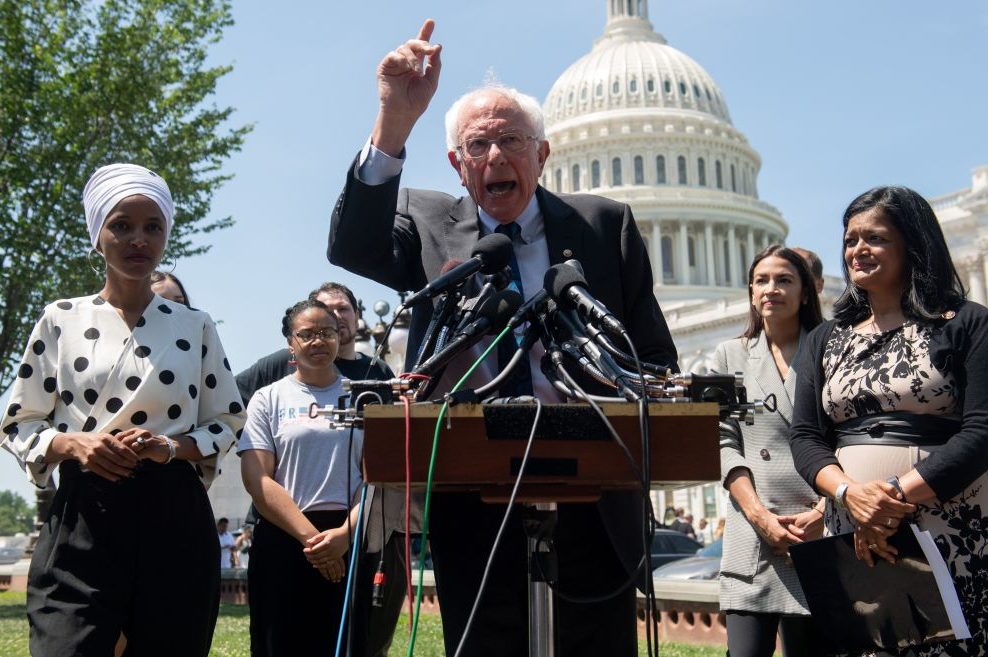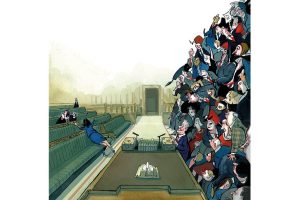I agree with Bernie Sanders, at least to a point. It is lamentable how students are expected to pay back an average of almost $40,000 in debt after they graduate from college. Frankly, it might be a good idea to cancel it, and if the money can be raised from Wall Street, well, so much the better.
Yes, I know the conservative arguments against this move. Does it not penalize people who have paid off their debts? It makes no difference to them. Should conservatives oppose the cutting of regressive taxes because people have already been paying them? A more challenging argument was made in a blunt form by Matt Walsh:
‘I guess I’m meant to cry tears of sympathy for all of these college grads with student loan debt. Somehow I just can’t muster a single tear. You chose to sign that dotted line. Nobody put a gun to your head. Fulfill your obligations and stop whining about it, for God’s sake.’
You can see the moral logic here. Unlike Bernie Sanders, I do not think people have a ‘right’ to free university education, and I am certain some people have spent irresponsibly rather than paying off their student loans. But in their defense, how were kids to know how much interest on those loans would boom? More significantly, why should kids have been expected to anticipate the creeping rise of credentialism?
Sanders’s idea has its limits, naturally. First, he appears to have that classic left-wing attitude that a free service is a good service. Sometimes this is true, but only up to a point. I appreciate the British National Health Service being free at the point of use, for example, but it has a fairly mediocre record when compared with other Western countries, on such important matters as avoiding preventable deaths.
One problem with the university system, regardless of its costs, is that its value has been overstated. Student enrollment has been climbing for decades, and, despite a small dip since 2010, is projected to increase in the 2020s. This rise was driven by a mixture of egalitarianism and material self-interest. Cultural and political elites assumed if rich, successful people like them had enjoyed the blessings of an extended academic education, far more people should do so. This had the happy and perhaps not entirely coincidental side-effect of enriching universities.
For all the noble intentions that might have driven this phenomenon, and the valuable results that it has yielded, it has had disturbing excesses. As George Leef wrote in ‘The Overselling of Higher Education’, it has led to ‘credential inflation’ as employers have responded:
‘…by using the possession of a college degree as a screening device. Few jobs demand such a high level of knowledge and skill that they cannot be performed by individuals with a sound basic education, but many employers now decline to consider high school graduates since there is such a large pool of college graduates available.’
This becomes something of a self-fulfilling prophecy as more and more young people attend university, ‘often with little if any gain in human capital that will prove beneficial in the labor market or in dealing with the challenges of life.’ (Maybe that sounds like snobbery, but I include myself among them. Never take creative writing, kids.)
But, a critic might suggest, a university education is not just about preparing someone for work, it is about their intellectual and personal development. It can be true! Yet most of us are not equipped to specialize or interested in specializing in academic fields and have no need of that kind of structured environment (and, as Bryan Caplan writes in The Case Against Education, the learning involved can be minimal). As for personal development, well, you suspect that universities tend to have a more negative than positive effect. In their book The Coddling of the American Mind, Jonathan Haidt and Greg Lukianoff criticize ‘safetyism’ in universities. They argue there is an emphasis on protecting rather than challenging students which enables fragility rather than personal growth.
A conservative can hardly avoid mentioning the dominance of left-wing ideas in the academy – notable when Bloom wrote The Closing of the American Mind and downright farcical today. Perhaps this makes my case sound partisan, but are we expected to believe progressive academics would have the same quasi-mystical respect for higher education if it involved more Anscombe than Adorno, more Scruton than Said, more Kołakowski than Karl Marx and more Herbert Butterfield than Herbert Marcuse?
Maybe we can agree with Mr Sanders, then, that student debt should be canceled. Kids were drawn into a system where their debts were rapidly inflated, and many if not most of them need never have been there. But the final words are indispensable. Offering everyone free academic education wastes years of time for many of them and depletes the income of Americans who had better things to do than study, as well as feeding a bloated system that undermines more than it elevates the society that sustains it. Cancel student debt, then cancel some universities.


















